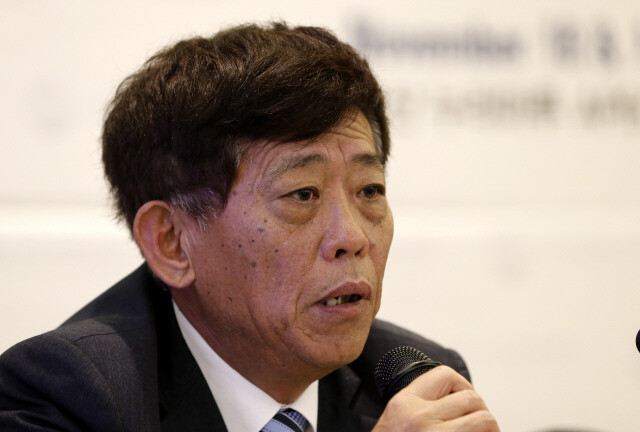hankyoreh
Links to other country sites 다른 나라 사이트 링크
[Interview] In North Korea, “things have changed a lot”

Jin Chang-yi, director of China’s Yanbian University Center for Inter-Korean Studies, said changes in North Korea have passed the early stages of reform and openness and that the time has come to change Seoul’s North Korea policy in response.
Jin’s proposal at the eleventh Hankyoreh-Busan International Symposium this week was for cooperative measures that are more in line with the Sunshine Policy under previous President Kim Dae-jung (1998-2003), using a mixture of the proverbial carrot and stick.
Hankyoreh (Hani): Are you saying that you sense meaningful change in North Korea?
Jin Chang-yi (Jin): I think that in terms of social changes, things have already passed what China had in the early stages of its reforms and openness. In social character terms, the influence of the market has already grown. The question now is whether they can build a market economy through regime policies and state institutions.
Hani: What do you think should be the new direction of South Korea’s North Korea policy?
Jin: The only way to support these social changes is through economic cooperation. Kim Dae-jung’s Sunshine Policy was introduced too early. North Korea was still going through its Arduous March at the time, and it was really struggling. Now North Korean society has changed. Ways of thinking and production have changed with the progress that has been made in introducing markets. So I think we need to encourage and support these changes as they affect government policy and institutions.
Hani: The South Korean government appears to see full-scale cooperation with the North as being out of the question as long as it has nuclear weapons.
Jin: Even if you consider it in terms of a long-term solution on the nuclear issue, there’s only one path left. The key question is whether or not we can lead North Korea toward reforms and openness. If we can‘t lead it toward reforms and openness, the nuclear problem is going to continue to exist. If we keep on with the current pressure tactics, it could end up giving the Kim Jong-un regime hundreds more reasons to keep its nuclear capabilities. If it adopts reforms and openness instead, then North Korea will have to cooperate and negotiate with other countries for its own economic development.
Hani: The idea of encouraging reforms and openness in North Korea is something people have already been talking about for a while now.
Jin: I think now things are different. North Korean society has already changed a lot. Also, there have been two characteristics to the Kim Jong-un regime. The first is the thing that South Korea usually focuses on, the fear-based politics. The other is the proactive, enthusiastic way it has responded to the social changes that are happening in the North. In that sense, it’s different from the Kim Jong-il regime, which was passive in its response. This is where I think the hope lies. These are elements we could use to encourage change.
By Kim Bo-geun, Director of the Hankyoreh Unification Institute
Please direct questions or comments to [english@hani.co.kr]
Editorial・opinion
![[Column] Season 2 of special prosecutor probe may be coming to Korea soon [Column] Season 2 of special prosecutor probe may be coming to Korea soon](https://flexible.img.hani.co.kr/flexible/normal/500/300/imgdb/original/2024/0426/3317141030699447.jpg) [Column] Season 2 of special prosecutor probe may be coming to Korea soon
[Column] Season 2 of special prosecutor probe may be coming to Korea soon![[Column] Park Geun-hye déjà vu in Yoon Suk-yeol [Column] Park Geun-hye déjà vu in Yoon Suk-yeol](https://flexible.img.hani.co.kr/flexible/normal/500/300/imgdb/original/2024/0424/651713945113788.jpg) [Column] Park Geun-hye déjà vu in Yoon Suk-yeol
[Column] Park Geun-hye déjà vu in Yoon Suk-yeol- [Editorial] New weight of N. Korea’s nuclear threats makes dialogue all the more urgent
- [Guest essay] The real reason Korea’s new right wants to dub Rhee a founding father
- [Column] ‘Choson’: Is it time we start referring to N. Korea in its own terms?
- [Editorial] Japan’s rewriting of history with Korea has gone too far
- [Column] The president’s questionable capacity for dialogue
- [Column] Are chaebol firms just pizza pies for families to divvy up as they please?
- [Column] Has Korea, too, crossed the Rubicon on China?
- [Correspondent’s column] In Japan’s alliance with US, echoes of its past alliances with UK
Most viewed articles
- 1‘We must say no’: Seoul defense chief on Korean, USFK involvement in hypothetical Taiwan crisis
- 2N. Korean delegation’s trip to Iran shows how Pyongyang is leveraging ties with Moscow
- 3[Column] Season 2 of special prosecutor probe may be coming to Korea soon
- 4‘Weddingflation’ breaks the bank for Korean couples-to-be
- 5[Column] Has Korea, too, crossed the Rubicon on China?
- 6[Editorial] New weight of N. Korea’s nuclear threats makes dialogue all the more urgent
- 7[Reportage] On US campuses, student risk arrest as they call for divestment from Israel
- 8Korea sees more deaths than births for 52nd consecutive month in February
- 9[Column] Park Geun-hye déjà vu in Yoon Suk-yeol
- 10[Guest essay] The real reason Korea’s new right wants to dub Rhee a founding father